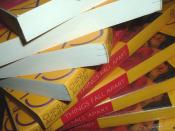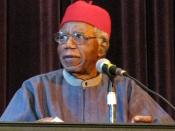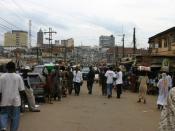In both Achebe's and Desai's novels, tension and conflict between the new and the old, traditional and modern are the strong undercurrents that move the story and the reader into an unconscious emotional uneasiness. In both novels, the backdrop and the story are engrossed in a struggle between two worlds, the new and the old fighting out its battles in the characters portrayed within. Achebe makes his stand in eastern Nigeria while Desai illustrates her point in Old Delhi.
In the first part of 'Things Fall Apart', Achebe, portrays a traditional African culture, but one on the verge of change. Early in the novel you can see change is already taking place. '...in the past a man who broke the peace was dragged on the ground throughout the village until he died. But after a while this custom was stopped because it spoiled the peace which it was meant to preserve.'
But traditions continued on, including ritual killing and banishment of one of the village leaders. But then things begin to change more rapidly with the coming of the missionaries. When they gave them the 'evil forest' to build their churches on there was no turning back. Many of the abused and outcast were converted when they saw that these new people prospered in the evil lands. The people started to revolt against their traditional gods. 'Three converts had gone into the village and boasted openly that all the gods were dead and impotent' They were beaten severely. With the coming of government the Christians gained power and shook the faith of the old ways. I believe the book pivots on this statement:
'Does the white man understand our custom about land? How can he when he does not even speak our tongue? But he says that our...


